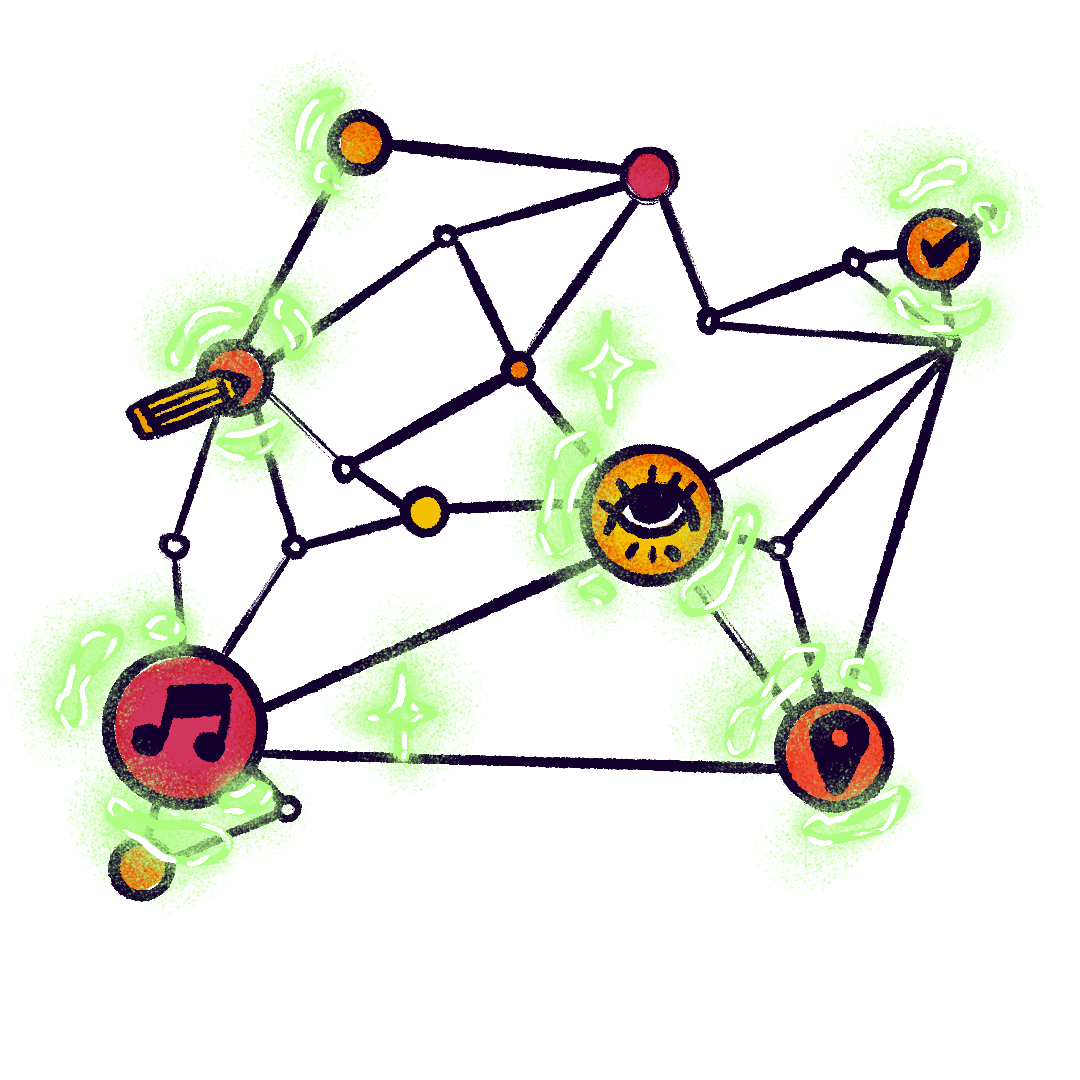Artificial intelligence (AI) is not just evolving, it’s undergoing a transformation that will redefine our interaction with technology, with key AI trends paving the way.
Leaving behind the fear-mongering headlines of its ability to replace humans, AI has really come into its own over the last year. Through constantly advancing platforms such as ChatGPT, Dall-E and Midjourney, which offer intuitive ways to enhance productivity, people are warming to AI as more of a useful tool for boosting efficiency as opposed to taking your job away.
And this is just the start. Tech experts are predicting that AI will significantly impact our lives, just like “the early days of the Internet”,
Take Amazon software development manager, Rob Kennedy, for example, who believes that AI is “poised to transform our world” in similar ways that the dot-com boom did that “we can’t fully predict”. And while that might be the case, we can certainly try.
So what does this mean for the events space? We’ve picked the brains of leading experts in the field to paint a picture of a future where this cunning technology is not just a gimmick, but an integral part of the industry.
Here are the predictions for AI in events for 2024 and how this ever-evolving innovation will impact event organisers in the year ahead.
AI Trend #1: AI-driven event discovery

Ted Dworkin, Eventbrite’s Chief Product Officer, offers a compelling vision of AI revolutionising how consumers will discover events in the not-so-distant future, in turn enhancing their interactions.
He sees an era where AI has shifted the paradigm from traditional search methodologies to more dynamic, intuitive and personalised ways for people to find and connect with the events that matter to them.
“Consumer event discovery will change fundamentally when prompt-based or conversation-based interactions are really powerful and effective,” he says.
“So today, you generally can issue a search, or maybe you get a suggestion as a link or a link from an event organiser and that’s the way you might discover, find out about or decide that you’re going to an event. But imagine being able to have a very lightweight and fluid conversation [with AI] that allows you to understand whether this is the best event for you, what the vibe of the event will be like, and any other event information that you want – and have it all be available just by asking rather than by having to hunt online or figure out keywords and scan QR codes.”
While he’s aware that not everyone is open to these kinds of conversational interfaces just yet, he believes that people will become increasingly comfortable with such platforms as they learn to trust that the results they’re getting are super relevant, personalised, and of high quality.
This more customised, AI-driven event discovery experience is something Dworkin says Eventbrite is already aware of and preparing for.
“We feel our responsibility is to invest actively and be very curious while prototyping and trying lots of things and putting those things in front of customers so that we get genuine feedback from actual humans trying this stuff.”
Dworkin’s prediction points towards a future where AI serves not just as a backend tool, but as a front-facing facilitator that makes it easier and more enjoyable for consumers to find and engage with events via more relevant, tailored and interactive experiences.
AI Trend #2: More engaging and personalised event experiences

Virtual events are another area in which AI is set to play a transformative role in the year ahead. The future of these events, as predicted by Natasha Wallace, VP of strategy at digital marketing agency Jellyfish, lies in creating more engaging and interactive experiences that are heavily augmented by AI technologies. This shift is not just about improving what already exists but redefining the virtual event experience altogether.
A key aspect of this transformation is the ability of AI to personalise the experience for event-goers. The tech, Wallace predicts, will enable a level of customisation that tailors the event to individual attendees’ preferences and interests, for example, at a company conference. This could mean anything from personalised schedules for specific attendees to AI-driven recommendations on sessions or speakers, enhancing the overall engagement and value for each participant. There’s also potential for AI to act as a personal assistant during such events.
“Imagine if we created a searchable database for all the wealth of information shared during an event for attendees to access at any time,” Wallace explains.
“So just making it a bit more accessible and human by facilitating connection, and building a bit of equity into the moment by making that knowledge easier to get to afterwards.”
AI Trend #3: Transforming event planning and strategy

AI is also reshaping how events are organised by offering increasingly compelling solutions for strategic planning and data-driven decision-making.
Ross Simmons, Founder of B2B content marketing agency Foundation Marketing, and a renowned expert in digital marketing, explains just how AI is becoming an invaluable asset for event organizers, highlighting its emerging role as a strategic planning “assistant”.
“This would be less about generative content creation [like how ChatGPT is often used now], and more about being a strategic assistant – so helping you operate much more efficiently and effectively as an event manager,” he says.
Across the next year, Simmons predicts that we’ll see AI used more and more by organizers to conduct venue research, create marketing strategies tailored to specific locales and provide detailed market analysis.
“I think there’s a lot of room and opportunity for that,” he adds. “For example, event organisers would be able to upload all the feedback they’ve received from attendees and ask [AI] to analyse this feedback and give you recommendations on how you can improve your event for the next time as well as give you competitive research around other events that might be happening in a certain region.”
From here, Simmons suggests that organisers could use AI to identify and create personas for potential attendees of future events in unknown regions and potentially even use it to create a localised strategy on how you can penetrate that particular market more successfully.
According to Simmons, AI of the near future won’t just be about event organisers creating content like event descriptions to help in their marketing efforts, it’ll offer meaningful insights and suggestions when it comes to strategy and results.
AI Trend #4: Revolutionising event content with multimodal technology

AI’s advancements, particularly in multimodal capabilities, are setting the stage for a transformative year ahead, according to Eventbrite’s senior engineering manager of incubation and innovation, Andy Abbott.
Multimodal AI systems are those that can understand, interpret and generate information across multiple modes or types of input, such as text, images, audio and video. Abbott predicts that while 2023 saw a focus on textual content generation through AI, 2024 will witness an explosion in the use of this multimodal AI, especially in video generation, which he observes is ramping up in intelligence almost by the week, and thus believes could help revolutionise content creation for events.
“Video multimodal [AI] opens the doors to a lot of what’s being consumed today – especially by the younger generations on platforms like YouTube, TikTok, and Instagram,” Abbott explains.
“So I think there’s going to be a lot of short-form video content creation, and for the event space, that’s really interesting because it will allow us to create products for our creators to help market their content to and in areas that are where people are looking for content.
“For example, if I can only create textual content, that limits me to emails and social media posts, but if everyone’s consuming video content – while there are some hurdles preventing us from getting there right now – I see that most doors being open here quickly in 2024.”
With such tech, he says, Eventbrite could provide functionality to organisers so they can market their events to the right users. However, he insists that this development isn’t just about enhancing marketing efforts, but about creating a more immersive and interactive experience for event attendees. With AI’s ability to understand and generate video content, event organisers can craft more compelling narratives and visual presentations, making events not only more engaging but also more accessible.
AI Trend #5: The democratisation of the events space

Abbott also recognizes the transformative impact of AI in the events space, particularly in how it will – how he sees it – “democratise” access and efficiency for event creators.
“I think what we’ve seen in the last few months is really starting to level the playing field for creators,” he says. “AI is removing a lot of those tedious tasks…it’s removing the marketing aspect of events”.
With AI having the potential to streamline the more mundane aspects of event planning, Abbott envisions the technology as an enabler for creators to concentrate on their true interests, whether it’s art, music, or sharing their craft, without being bogged down by the logistics.
“There’s a lot of just tedious stuff that AI will be able to take off your plate and allow you to focus on what you’re passionate about, which will help to open doors,” he says.
This shift in focus from administrative tasks to creative expression is significant for not just experienced event organisers but also those looking to get a leg up in the field, Abbott claims, highlighting AI’s role in empowering new creators.
“It opens the door for a lot of new creators, like people that necessarily wouldn’t get into the space because they don’t even know where to start,” he adds. “Will those small-time event organisers be able to compete with the top event organisers? Probably not, but at least they have a way into the space, which will really help level the playing field.”
Abbott’s vision for AI in events is clearly one of inclusivity and accessibility, where the technology serves as a leveller, breaking down barriers to entry and enabling a wider range of individuals to participate in event creation and management. This democratisation, as he sees it, is not just about making tasks easier but about opening up opportunities for creativity and participation in the event space.
As we navigate through these predictions for the year ahead, one thing becomes clear: the AI of 2024 is set to be more integrated, innovative and indispensable than ever.






